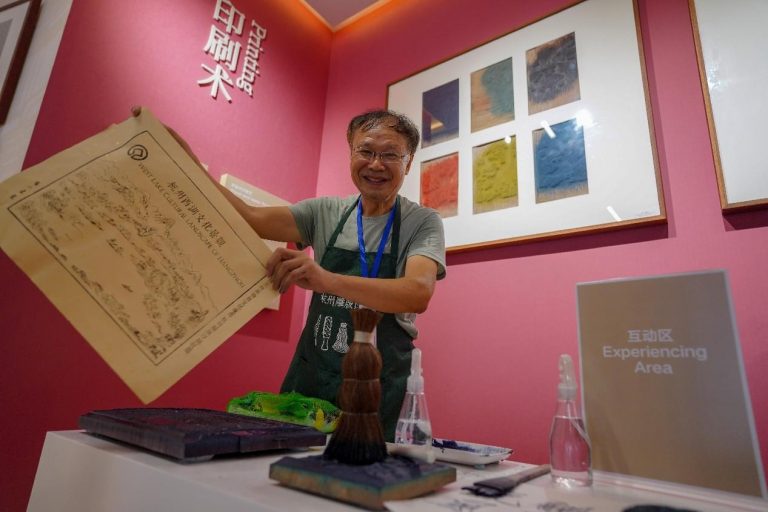
According to Dou Hao, and Zheng Yi, The Asian Games is a grand sports event and a cultural feast as well.
The Hangzhou Asian Games is brimming with a rich humanistic spirit, from the ingenious designs of the venues to the cultural landscapes in the streets and alleyways of the city, and from the diverse cultural activities to the warm and caring volunteer services.
The emblem “Tides Surging” of the Hangzhou Asian Games is the first visual identity symbol revealed for the Games. Its fan-shaped design integrates elements such as the Qiantang River, Qiantang tidal bore, racetracks, internet symbols, and the sun representing the Olympic Council of Asia, fusing together the distinct culture of Jiangnan, or south of the Yangtze River, with contemporary vibrancy.
Hangzhou is known as the “City of Silk,” and the silk elements of the city inspired the graceful yet flexible, fine yet smooth, and gentle yet vibrant design of the Asian Games’ core graphics “Meeting the World.” It represents the artistic conception of “meeting the world”.
From the West Lake imagery in the “Shan Shui” medals to the featured floral branches in the victory ceremony bouquet “Fruits of Triumph,” and to the blue and white porcelain elements on the uniforms designed for the Chinese delegation, traditional culture can be seen everywhere, reflecting Hangzhou’s humanistic beauty.
The humanistic touch is also ingrained in the architectural aesthetics of the venues. The Yangshan Sports Climbing Center, located in Keqiao district, Zhejiang’s Shaoxing, resembling a silkworm cocoon, is the designated venue for the climbing events of the Hangzhou Asian Games. The hollowed exterior design reflects the silk culture in the Jiangnan water towns, seamlessly integrating elements of Chinese landscapes and international competitions.
“From the refined and elegant landscapes in the Jiangnan area, we will see a unique Asian Games. The diverse humanistic elements also reflect the cultural heritage and aesthetic charm of the city of Hangzhou,” said an official with the Hangzhou Asian Games Organizing Committee.
Beside the Hangzhou Olympic Sports Center, a dedicated Asian Flower Theme Park gathers over 200 flower varieties, conveying the vision of “Asian people progressing together.” On the Linping People’s Square, there are murals depicting the Grand Canal and intangible cultural heritage elements. In Qianwang Street in Hangzhou’s Lin’an district, wall relief sculptures with Asian Games motifs installed on building exteriors are quite eye-catching. Themed landscapes celebrating the Games greet visitors everywhere in this city.
In the Asian Games Village, there are various “Cultural Houses” where athletes are able to enjoy a cup of tea with friends, marvel at the intricate craftsmanship of fan-making, delve into the ancient techniques of traditional embroidery and porcelain making, and design and make their own personalized artistic seals. These “Cultural Houses” are truly enlightening windows showcasing the richness and beauty of the traditional Chinese culture.
In an ancient street in the Yuhang district of Hangzhou, there is an Asian Games cultural experience station where inheritors of intangible cultural heritage teach visitors the traditional craft of paper umbrella making. Fifty such cultural experience stations have been established across Hangzhou.
Currently, more than 100 cultural centers in Zhejiang province are collaborating to launch over 5,300 public cultural activities centered around the Asian Games. These activities encompass a wide range of artistic forms, including music, dance, traditional opera, traditional storytelling, fine arts, photography, and more.
Following the spirit of “Everyone is a Host,” the 1.48 million city volunteers in Hangzhou are extending the warmest welcome to guests across streets and neighborhoods, and at dedicated volunteer stations.
At the Asian Games Village, athletes are guided by smiling young volunteers. At a volunteer station in Xiaoshan district, volunteers offer not only rental services but also traffic guidance and scenic spot introduction for visitors.
The Hangzhou Asian Games not only brings together Asian athletes for competition but also upholds the vision of “beauty in diversity.” By adding non-Olympic events with unique Asian cultural characteristics, such as sepak takraw, Kabaddi, and karate, the Games encourage broader participation from more countries and regions.
It is believed that the Hangzhou Asian Games, with utmost sincerity, will deliver profound humanistic heritage and warmth to guests.










